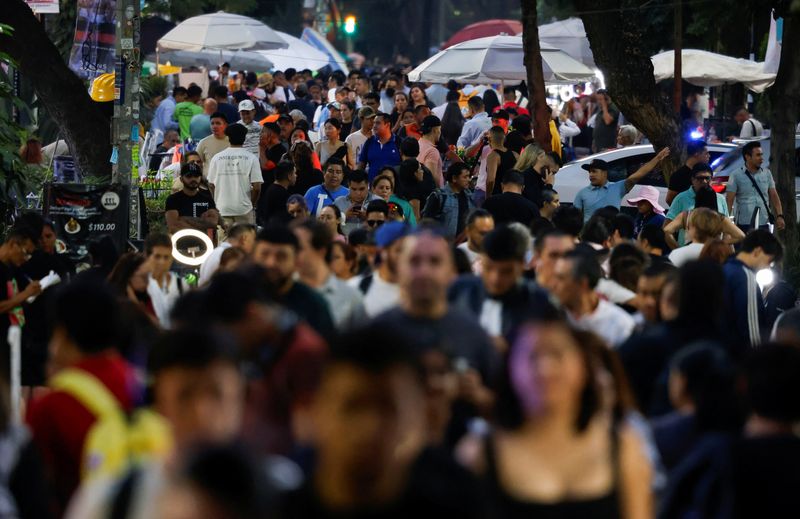
Violence mars Mexico vote as country prepares to elect first woman president
By Ana Isabel Martinez and Noe Torres
MEXICO CITY -Mexican voters experienced long lines on Sunday to cast ballots in a historic election expected to make leftist Claudia Sheinbaum, the ruling party candidate, the country’s first woman president.
Sheinbaum has led in opinion polls over her main competitor Xochitl Galvez, who represents an opposition coalition comprised of the Institutional Revolutionary Party (PRI), which ruled Mexico for about seven decades until democratic elections in 2000, the right-wing PAN and the leftist PRD party. Outgoing president Andres Manuel Lopez Obrador is Sheinbaum’s mentor.
A victory by either woman would represent a major step for Mexico, a country known for its macho culture. The winner, set to begin a six-year term on Oct. 1, will face formidable challenges including addressing organized crime violence.
On her way to vote on Sunday morning, Sheinbaum told journalists it was a “historic day” and that she felt at ease and content.
“Everyone must get out to vote,” Sheinbaum, a physicist and former Mexico City mayor, said on local TV.
Galvez, a businesswoman and senator, chatted with supporters as she arrived to cast her ballot shortly after polls opened.
“God is with me,” Galvez said, adding that she was expecting a difficult day.
Lopez Obrador greeted supporters and posed for photos as he walked from the presidential palace to vote with his wife.
There were long lines of voters outside polling places, even before they opened at 8 a.m. local time (1400 GMT), with some reports of delayed openings.
The campaign has been marred by violence, with 38 candidates murdered including a local candidate who was fatally shot on Saturday night. That is the highest toll in Mexico’s modern history, stoking concerns about the threat of warring drug cartels to democracy.
Almost 100 million Mexicans are eligible to vote in Sunday’s election. Other positions up for grabs include Mexico City’s mayor, eight governorships and both chambers of Congress. About 20,000 elected positions are on ballots, the most in Mexico’s history.
The polls will close at 6 p.m. local time (0000 GMT on Monday). The first official preliminary results are expected late on Sunday.
‘FLOODED WITH BLOOD’
“The country is flooded with blood as a result of so much corruption,” said Rosa Maria Baltazar, 69, a voter in Mexico City’s upper-middle class Del Valle neighborhood. “I wish for a change of government for my country, something for a better life.”
Jorge Martinez, a 35-year-old dog walker and part-time security guard, said he had never seen lines so long, as he waited to vote in the capital’s wealthy Polanco neighborhood.
“I am going to vote for Claudia because she has better proposals and she says that she is going to improve some things that (Lopez Obrador) did not do well, such as education and security issues,” Martinez said.
Lopez Obrador has loomed over the campaign, seeking to turn the vote into a referendum on his political agenda. Sheinbaum has rejected opposition claims that she would be a “puppet” of Lopez Obrador, though she has pledged to continue many of his policies including those that have helped Mexico’s poorest.
Polls indicate that their ruling party Morena is likely to fall short of securing a two-thirds majority in Congress, potentially making it more difficult for Sheinbaum to win constitutional reforms.
Challenges ahead for the next president also include addressing electricity and water shortages and luring manufacturers to relocate as part of the nearshoring trend, in which companies move supply chains closer to their main markets. The election winner also will have to wrestle with what to do with Pemex, the state oil giant that has seen production decline for two decades and is drowning in debt.
Both candidates have promised to expand welfare programs, though Mexico has a large deficit this year and sluggish GDP growth of just 1.5% expected by the central bank next year.
The new president will face tense negotiations with the United States over the huge flows of U.S.-bound migrants crossing Mexico and security cooperation over drug trafficking at a time when the U.S. fentanyl epidemic rages.
Mexican officials expect these negotiations to be more difficult if the U.S. presidency is won by Donald Trump in November. Trump, the first U.S. president to be convicted of a crime, has vowed to impose 100% tariffs on Chinese cars made in Mexico and said he would mobilize special forces to fight the cartels.
Lorena Bustillos, a member of the Raramuri community, one of Mexico’s poorest Indigenous groups, lives in the northern state of Chihuahua. Bustillos said she did not trust any of the candidates to make good on their sweeping election promises.
“They come to visit and see all our needs, but then don’t take action,” Bustillos said.
